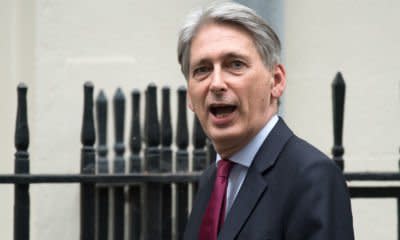Boost for Chancellor as September borrowing lowest for ten years

Chancellor Philip Hammond has received a boost ahead of next month's Budget as public sector borrowing in September fell to its lowest in ten years.
The borrowing figure of £5.9bn - which excludes the impact of bank bail-outs - was 11%, or £700m, lower than the same month last year - and beat the £6.5bn reading expected by economists.
It was the lowest monthly deficit for September since 2007, before the financial crisis took hold.
The figures from the Office for National Statistics (ONS) marked the third month in which public finances have performed better than expected - and also saw the deficit for August revised down by about £1bn to £4.7bn.
It means that for the financial year-to-date, borrowing is running at £32.5bn, 7% lower than at the same stage a year ago.
That suggests the Chancellor looks well placed to beat the performance forecast by the Office for Budget Responsibility (OBR), which has pencilled in a 28% rise in borrowing for the financial year to the end of March.
The September data showed an uptick in income tax receipts on the same month last year but a slight fall in corporation tax revenues.
The UK's debt mountain stood at £1.785tn, a rise of £145bn on last year.
Interest payments on the debt in September climbed by £400m compared to last year to £3.7bn - thanks to the rise in inflation, because about a third of Government bonds are linked to the inflation rate.
October's public finance figures will be published on 21 November, a day before the Budget.
Mr Hammond is under pressure both from Labour and some in his own Conservative party to loosen the purse strings on spending with public sector pay restraint in particular focus.
However he was dealt a blow earlier this month when the OBR said it was likely to cut the outlook for productivity growth, which may suggest slower economic expansion, and tax revenues, in the future.
:: Productivity decline is headache for Hammond
Paul Hollingsworth, senior UK economist at Capital Economics, said that if borrowing maintained its trend for the rest of the fiscal year, it would be on course to come in about £16bn below the OBR's forecast.
But he said it was "too soon for the Chancellor to begin loosening the purse strings in response" as negative factors affecting the public finances were expected to be loaded towards the latter half of the year.
Samuel Tombs, chief UK economist at Pantheon Macroeconomics, said the fall in borrowing continued to reflect the Government pushing through spending cuts, rather than surging tax receipts.
He added that Mr Hammond looked unlikely to loosen spending restraints now.
"The Chancellor likely will retain scope to ease the fiscal consolidation in the event of a damaging hard Brexit, rather than ease policy now," Mr Tombs said.
The Treasury said: "Whilst we've made great progress getting the deficit down by over two thirds, government borrowing is still far too high at over £150m a day.
"We will continue to take a balanced approach that deals with our debts and allows us to invest in our public services."

 Yahoo Finance
Yahoo Finance 